Human rights 177 results
-
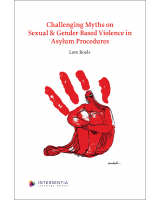
Challenging Myths on Sexual & Gender-Based Violence in Asylum Procedure
Book | 1st edition 2026 | World | Lore RoelsThis book reveals how rape myths – incorrect beliefs about rape (survivors/perpetrators) – permeate asylum decision making.
€135.00 incl. VAT -
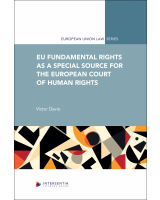
EU Fundamental Rights as a Special Source for the European Court of Human Rights
Book | 1st edition 2026 | Europe, United Kingdom | Victor DavioThis work proposes a new perspective on the dynamics of influence between EU and ECHR laws: it examines the influence of the growing body of EU fundamental rights on ECHR law.
€110.00 incl. VAT -
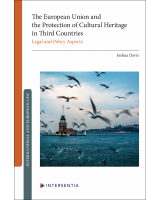
The European Union and the Protection of Cultural Heritage in Third Countries
Legal and Policy AspectsBook | 1st edition 2026 | Europe, United Kingdom | Joshua DavisThis book examines how a political entity can act to protect heritage beyond its borders, and what the legitimacy of gives such action its legitimacy.
€156.00 incl. VAT -

Les dispositifs publics interconvictionnels en Europe
New Forms of Dialogue and Concertation Between Public Authorities and Religions or PhilosophiesBook | 1st edition 2025 | Europe | Patrick De Pooter, Louis-Léon Christians, Stéphanie WattierThe practices of participatory democracy, open to all, renew the relationships between public authorities and stakeholders of conviction (religions and philosophies).
€85.00 incl. VAT -
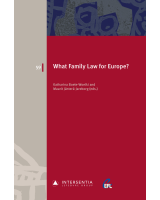
What Family Law for Europe?
Book | 1st edition 2025 | Europe, United Kingdom | Katharina Boele-Woelki, Maarit Jänterä-JareborgThe two-day conference brings together leading family law researchers from across Europe to Stockholm. In addition, in an unprecedented move, experts in the field of family law from all Nordic governments will participate throughout the conference. The aim is to bring together the imaginative and knowledgeable academic research in Europe with legislative and advisory activities.
€109.00 incl. VAT -
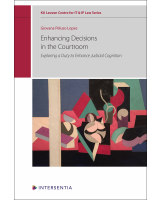
Enhancing Decisions in the Courtroom
Exploring a Duty to Enhance Judicial CognitionBook | 1st edition 2025 | United Kingdom, Europe | Giovana Peluso LopesThis book explores possible ethical justifications for a moral duty for judges to enhance their cognition and examines how this duty sits within the existing legal framework on judicial liability, professional duties, and human rights.
€140.00 incl. VAT -
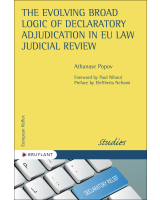
The evolving broad logic of declaratory adjudication in EU law judicial review
Book | 1st edition 2025 | Europe | Athanase PopovThe book shows how difficult constitutional theory about effective judicial protection in EU law is to implement.
€95.00 incl. VAT -
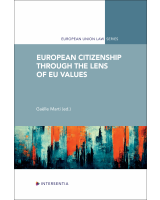
European Citizenship through the Lens of EU Values
Book | 1st edition 2025 | United Kingdom, EuropeIn the wake of the Convention on the Future of Europe, and against the backdrop of the many challenges facing the EU (security, economic, migration, health, climate, digital, etc.), this book aims to take stock of the scope and content of European citizenship and its capacity to embody the values of the Union.
€70.00 incl. VAT -

Restricting Liberty to Prevent Terrorism
The Belgian and the UK Approaches to Direct Restrictions to the Right to Liberty to Prevent TerrorismBook | 1st edition 2025 | Europe, United Kingdom | Ward YpermanThis book explores counterterrorism measures in Belgium and the UK, focusing on rights to liberty in the wake of European terrorist attacks during the first two decades of the century. Delve into legal frameworks, case studies, and recommendations for aligning Belgian legislation with European human rights standards.
€160.00 incl. VAT -
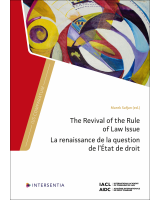
The Revival of the Rule of Law Issue
Book | 1st edition 2024 | World | Marek SafjanThe rule of law is one of the most important topics discussed both in the legal community and in wider society. This book presents dozens of reports on the situation in various European and non-European legal systems. It answers questions about the conditions for ensuring the rule of law and about the risks and challenges faced by the democratic state of law today.
€207.00 incl. VAT -
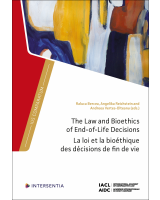
The Law and Bioethics of End-of-Life Decisions
Book | 1st edition 2024 | World | Raluca Bercea, Angelika Reichstein, Andreea Vertes-OlteanuThe Law and Bioethics of End-of-Life Decisions addresses the legal, ethical and philosophical issues surrounding end-of-life decisions, including assisted dying, palliative care and withdrawal of treatment.
€213.00 incl. VAT -
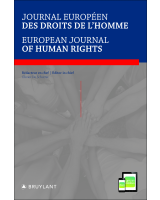
Journal européen des droits de l'homme / European Journal of Human Rights
Journal | Subscription 2024 - 5 issues per year | Belgium, Europe | Olivier De SchutterThe European Journal of Human Rights reports systematically on developments related to human rights within the United Nations and the International Labour Organisation, within the Council of Europe and the European Union.
-
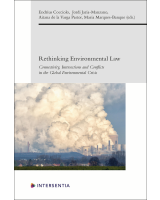
Rethinking Environmental Law
Connectivity, Intersections and Conflicts in the Global Environmental CrisisBook | 1st edition 2024 | World | Endrius Cocciolo, Jordi Jaria-Manzano, Aitana De la Varga, Maria Marques-BanqueThis book explores the current evolution of environmental law, focusing on connectivity, conflicts, and interdisciplinary collaboration.
€83.00 incl. VAT -
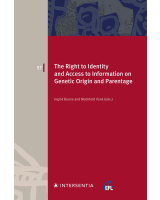
The Right to Identity and Access to Information on Genetic Origin and Parentage
E01Book | 1st edition 2024 | World | Ingrid Boone, Machteld VonkThe Right to Identity and Access to Information on Genetic Origin and Parentage discusses recent developments on the right to know one’s genetic origins in the context of donor conception. It includes both legal analyses and findings from psychological research, delving not only into the theoretical framework, but, additionally, assessing the practices of counselling and DNA databases.
€82.00 incl. VAT -
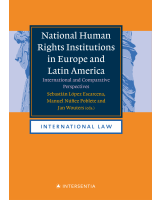
National Human Rights Institutions in Europe and Latin America
International and Comparative PerspectivesBook | 1st edition 2024 | World | Sebastian Lopez Escarcena, Manuel Nunez Poblete, Jan WoutersFilling a gap in the legal literature, this book is aimed at studying national human rights institutions from an international and comparative standpoint, contrasting the experiences and practices in Europe and Latin America.
€145.00 incl. VAT -
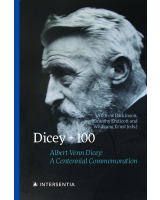
Dicey + 100
Albert Venn Dicey: A Centennial CommemorationBook | 1st edition 2024 | Andrew Dickinson, Timothy Endicott, Wolfgang ErnstMarking the centenary of the death of Albert Venn Dicey, this book addresses Dicey’s work and its continued influence today from a variety of perspectives.
€93.00 incl. VAT -
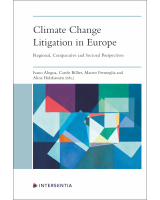
Climate Change Litigation in Europe
Regional, Comparative and Sectoral PerspectivesBook | 1st edition 2024 | United Kingdom, Europe | Ivano Alogna, Carole Billet, Matteo Fermeglia, Alina HolzhausenThis book addresses the most topical issues related to climate change litigation in Europe. It unpacks the substantive and procedural dimensions of ongoing climate change litigation before domestic and supranational courts and the prospective avenues for future climate change litigation.
€124.00 incl. VAT -
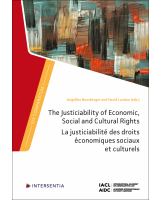
The Justiciability of Economic, Social and Cultural Rights
Book | 1st edition 2023 | World | Angelika Nußberger, David LandauThis book includes a general report and a series of special national reports that discuss trends in the judicial enforcement of economic, social and cultural rights worldwide.€250.00 incl. VAT -
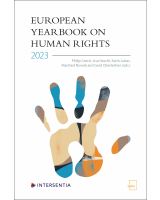
European Yearbook on Human Rights 2023
Book | 1st edition 2023 | Philip Czech, Lisa Heschl, Karin Lukas, Manfred Nowak, Gerd OberleitnerThe European Yearbook on Human Rights brings together renowned scholars, emerging voices and practitioners, comprising contributions which engage with some of the most important human rights issues and developments in Europe. The Yearbook helps to better understand the rich landscape of the European regional human rights system and is intended to stimulate discussions, critical thinking and further research in this field.
€216.00 incl. VAT -
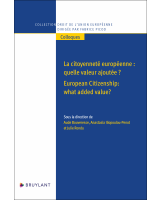
La citoyenneté européenne, quelle valeur ajoutée? European Citizenship: what added value ?
Book | 1st edition 2023 | Europe | Aude Bouveresse, Anastasia Iliopoulou Penot, Anastasia Iliopoulou-Penot, Julie RonduTrente ans après sa consécration, le statut de citoyen européen a-t-il tenu ses promesses ? À visée académique, l’ouvrage procède à une analyse critique des acquis, des évolutions et des enjeux actuels de la citoyenneté de l’Union européenne.
€98.00 incl. VAT